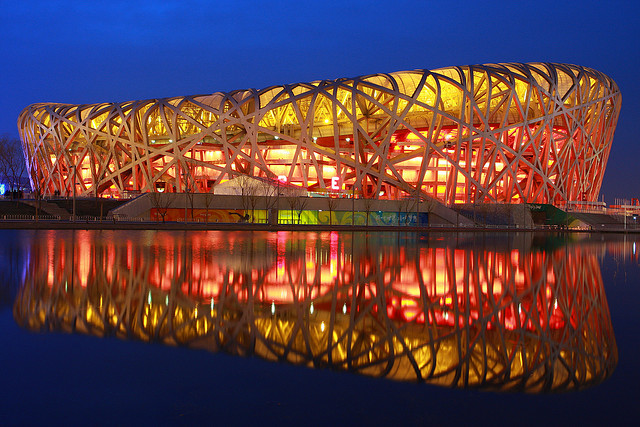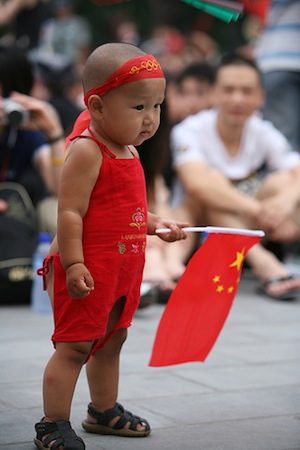Interview: How China Changed the Olympics Forever

Chinese Olympic gold medalist Liu Xiang poses for a portrait shoot at the National Sports Training Centre on July 1, 2007 in Beijing, China. (Adam Pretty/Getty Images)
Anthropologist Susan Brownell has written many books about sports and the Olympics in China. Her monograph Training the Body for China is one of the few books about sports and China, and she is also the author of an important book on China and the Olympics, and an edited book (with Bill Kelly) on Olympics in East Asia. In addition, four years ago Brownell contributed a string of insightful posts for The China Beat on sports, spectacle and the People's Republic of China, some of which were then reprinted in the book China in 2008: A Year of Great Significance.
Asia Society Associate Fellow Jeffrey Wasserstrom interviewed Brownell when, appropriately for a scholar with a strong interest in the Olympics, she had just returned from Greece.
One of your main points in 2008 was that people often focused on the wrong question about the Beijing Games. Instead of putting so much stress on how the Olympics were likely to "change China," you argued, we also needed to pay attention to how China might "change the Olympics." Looking back four years on, what do you think the biggest impact China's role as host country has had on the Olympics as a sporting event, as spectacle, or both?
My question, "will the Olympics change China, or will China change the Olympics?" was really an attempt to prod my audiences to think about the bigger question of the implications for the developed West of China's rise, because Westerners seemed so concerned about the question of whether hosting the Olympics would push China toward Western-style political reforms, and no one seemed concerned about the question of whether, instead of us changing China, China might actually change us. I felt that many of my Western listeners needed to be awakened out of their smug self-centeredness.
China did change the Olympic Games, and since the Olympic Games are a thoroughly global event, those changes reflect the changes that China has instigated in the world order. The world financial crisis hit right after the Beijing Games, in large part due to the fact that the integration of China into the global economy, which the Olympics marked, had tipped it off balance. It should give us pause that in the midst of this crisis, Olympic broadcast and sponsorship revenues have increased astronomically from the 2006-2008 cycle (Torino and Beijing) to the 2010-2012 cycle (Vancouver and London). Chinese Central Television paid $99.5 million for the 2010-2012 broadcast rights, while it had not even bought individual broadcasting rights for 2008, but was part of the Asia-Pacific Broadcasting Union that had paid a mere $17.5 million. That is one measure of the rapid growth of the Chinese economy in the past decade. Both global sponsorship and broadcast revenues are set to break records in the 2014-2016 cycle. So if the Olympic Games are any indication, the global economy seems alive and well, and China is now a major player.
While we Americans are lamenting the sad state of our economy and fearing that we will be eclipsed by China, it is instructive to note that in 2008 the number of American sponsors in the IOC's global TOP program reached an all-time low of 5 out of the 12, while Lenovo became China's first TOP sponsor. Four years later, the IOC was only able to sign up 11 TOP sponsors, but six of them are American, none is Chinese, and one is Taiwanese (Acer). Furthermore, NBC paid an astounding $4.38 billion for the television broadcast rights from 2014 through 2020, apparently betting that the cost will continue to rise. So the view from the peak of the Olympic Games makes it seem that the American economy is doing fine, too — and that we still dominate the global economy. Nevertheless, a pro-Obama super-PAC is planning to broadcast a TV ad spoofing the Olympic parade of nations, in which presidential candidate Mitt Romney is credited with outsourcing U.S. jobs to the nations — most prominently China — whose delegations parade by.
Did China change the Olympics? Yes — since the Chinese leadership invested the Olympics with so much significance, the economic and political powers-that-be in the developed West took them more seriously as well. Romney, whose career got a boost when he was hired to navigate the Salt Lake City Olympic committee through its bribery scandal, will be attending the opening ceremony in London, as will Michelle Obama. The pundits seem to agree that no one will be able to match the ceremonies in Beijing — because of the "unlimited" resources that can be commanded by an authoritarian government — but if London fails to organize an event that is outstanding in other ways, it will be interesting to see what kind of discussion it initiates about the strengths and weaknesses of liberal democracy.
Another legacy of Beijing was to empower transnational society (see my article in the June issue of the British Journal of Sociology). Last January the U.N. sent a special rapporteur on adequate housing to Rio de Janeiro to report on Olympics-related evictions there, something it did not do in the lead-up to Beijing; perhaps it had not wanted to test its tentative relationship with the IOC before the Beijing Games — but when IOC President Rogge stated in exasperation that monitoring human rights was the U.N.'s job and not the IOC's, he provided the U.N. with an entrée. Amnesty International protested the naming of Dow Chemical as a TOP sponsor, resulting in the resignation of the chair of the London "Sustainability Commission" in January. Human Rights Watch pressured the IOC to compel Saudi Arabia to send its first woman to the Olympic Games; it was just announced that the Saudis, as well as the other two holdouts (Brunei and Qatar) would send their first female athletes.
There is some overlap between the kinds of stories the media has been carrying about the London Games and the ones they ran during the lead-up to the Beijing ones. For example, the look of new arenas and how they fit into the fabric of a major city is again in the news, as is concern over security. There are some stories, though, that are radically different. What strikes you about the contrasts in media coverage?
I had thought that the overall amount of media coverage would decline leading up to London, but when I looked at the numbers of reports in major English-language print media in the last month (in Nexis/Lexis), I discovered that actually there is even more coverage than in the lead-up to Beijing — in part because the members of the "Anglo-Saxon clique" (as it is sometimes called inside the IOC) are reporting on themselves. It's also a manifestation of the energy that Beijing injected into the Olympic phenomenon.
I do think the nature of the coverage is different. There were riots and mass evictions in London, but when I emailed a journalist friend to ask why these were not getting the attention that they got in Beijing, he replied that these are "normal games" and that East London really needed regeneration. Much of the critical media coverage of China was the product of a mutual production cycle in which advocacy groups released reports at regular intervals, which were then covered in the media. The "news" was the release of the report and not necessarily a concrete event. The two major news generators, Amnesty International and Human Rights Watch, have been less active on Olympics-related issues this time around, and the media has given them less coverage. Just to give one example, in the week after the resignation of the LOCOG sustainability chairperson, there were 21 articles about it in major Anglophone media, but in the same week, there were 17 articles that mentioned the Chinese dissident Ai Weiwei although there was no new "news" about him (figures from Lexis/Nexis). Apparently, criticizing the Chinese government is more popular than criticizing multinational corporations.

Beijing's Bird's Nest Olympic stadium (Flickr/Benny Wijaya)
Do you think that, after the strong showing China made in the medal count in 2008, there is more or less pressure on Chinese athletes this year? And is the same stress being put on winning gold medals, as opposed to simply medaling in an event, that there has been in the past? Also, do you think the pressure is similar for male as opposed to female athletes on the Chinese team?
For two decades now there has been criticism of the single-minded focus on Olympic medals in the state-supported sport system, but serious debate was postponed until after the Beijing Olympics due to the recognition that it would be good if China made an optimal showing at its own games. The debate kicked off immediately after the closing ceremony, and the State Sport General Administration began giving a modicum of attention and funding to popular and school sport. And so if China doesn't match its gold medal count in Beijing (51), the Sport General Administration will not only have an excuse, but can use it as proof that it is now paying more attention to popular sport.
Internally the usual Olympic medal plan was established in 2010: each sport was given an expected medal quota, with each athlete understanding his or her obligation to contribute. However, I don't think that anything can match the pressure they were under in 2008 — not just athletes, but also administrators. After all, the recent jail sentence for corruption of the former president of the Chinese Football (soccer) Association was enabled by the team's embarrassing performance in 2008. Of the 396 athletes on the 2012 Olympic team, 171 are male and 225 are female, so there's a greater burden on the women to bring home medals. But medals in most women's sports are easier to get, which is why there are so many women on the team.
There is one person who may be under more pressure than he was in 2008 — the 110 meter hurdler and national icon Liu Xiang, who pulled out of his preliminaries in Beijing due to an injury. There were many who felt that he should have run at any cost. Two weeks ago he pulled out of the finals of the Grand Prix, so his countrymen are again cursing his lack of a do-or-die spirit. If he cannot redeem himself in London, he may well go down in Chinese sport history as a villain instead of a hero.
Is there any question you are getting tired of being asked by journalists who contact you about the Games? Any question you wish they would ask you more — or you wish I had asked you in this interview?
"Will the U.S. or China win the medal count?" Actually, I can't complain too much, because that question opens up interesting possibilities for analyzing market-based vs. state-supported sport, or the support for women athletes and minor sports in the U.S. vs. China, or other bigger questions. The word in China is that the race for the gold medal count (the one they really care about) will be very close, with China getting 35-39 gold medals, and U.S.'s total depending to some degree on whether the host country steps up (as host countries usually do) and takes away medals from the U.S. in key events in which they are both strong, such as track and field.
I wish that more journalists would approach their stories on China asking, "What does China do admirably, which we could learn from?" One of the points I try to hammer home is that government-supported sport is more supportive of women than market-based sport, and that's one reason China topped the U.S. in the gold medal count in 2008. Americans don't really want to hear that.
Any book other than your own that you'd point an intellectually curious reader of this interview to in getting ready for this year's London Games or prepping well ahead perhaps for the 2016 ones in Rio? Could be a history of the Olympics, something about China, something just about sports.
To get ready for London, I recommend the special issue of the British Journal of Sociology on "Olympic and World Sport: Making Transnational Society?" which just came out in June (Vol. 62, No. 3). It contains two excellent articles on Olympic security, which has been one of the main media stories. (I co-edited the issue, but that doesn't count as a book of my own, does it? I do have an article in it on the human rights debates that surrounded the Beijing Olympics.) There is also a murder mystery about the London Games (James Patterson, Private Games), which makes me wonder why I am working so hard doing research on difficult-to-access organizations when it's possible to make stuff up and get onto the New York Times bestseller list.
There's a lot of good sport history coming out these days. Keep an eye on the new series at the University of California Press, "Sport in World History" (I am on the editorial board). We hope to have a book on soccer (football) in Brazil out by the 2014 World Cup, and a book on Olympic Games in East Asia is also on the drawing board. I feel less satisfied with social science works on the Olympic Games. The Olympics are just too big to handle. I'm still trying to finish my book on the Beijing Olympics …

Chinese beach volleyball players Chen Xue and Xi Zhang at the 2008 Olympics. (Flickr/Brazil Women's Beach Volleyball Team)


